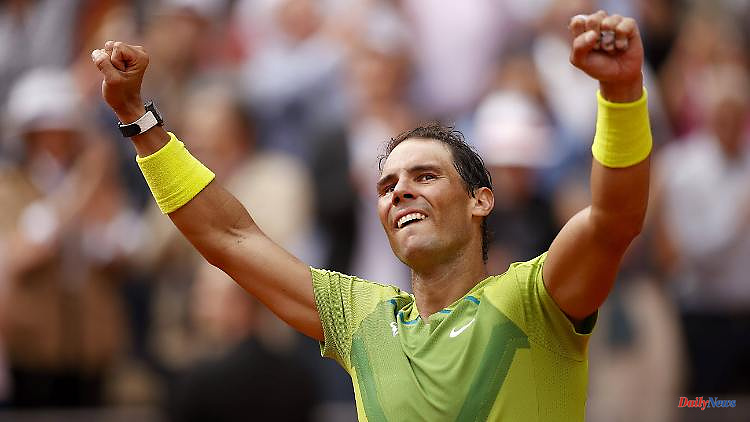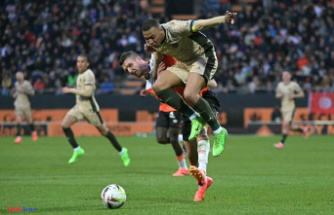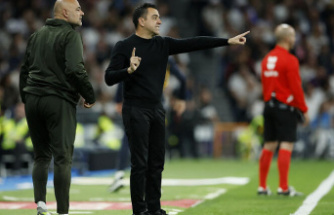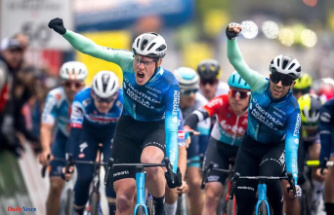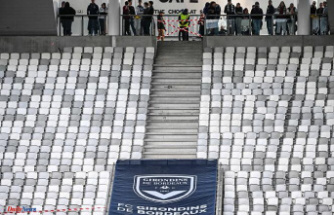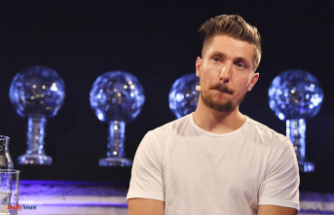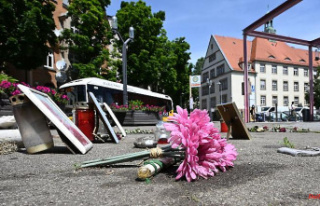Actually, Rafael Nadal could not have played in Paris. Only constant injections for the foot make the Spaniard's 14th triumph at the French Open possible. The King of Paris himself knows that things cannot go on like this. A bitter end is imminent.
There is no shortage of dazzling royal figures in the French monarchy. There was the "fat". There was the "pious". There was the "lion", the "saint", the "good", the "kind", the "mad". And there is Rafael Nadal, the "superior". Or better: The "most powerful thing that ever existed". At least on the red ashes of Roland Garros. No tennis player before, and possibly never again, has made this sacred ground at the French Open his subject and friend as much as the Spanish giant. On Sunday he achieved his 14th triumph in his 17th participation. No existing superlative does it justice.
The duel with the Norwegian Casper Ruud, after all number eight in the world, was mercilessly one-sided. Even if Nadal was far from playing his best tennis. He even made a surprising "many" mistakes, but then ended the match in such a typical way. He settled the 23-year-old with his outstanding angle game before letting a backhand crash down the line - lucky. For his 22nd triumph at a Grand Slam. He has now lost two titles to his eternal rivals Roger Federer and Novak Djokovic. The win against Ruud was already the 112th (!) in the 115th (!) match in Paris. The record of defeats is quickly summarized: he lost twice to Djokovic and once to the long-forgotten Swede Robin Söderling.
How many more victories will the "King of Paris" celebrate in Roland Garros? Completely unclear. Because Nadal trembles to continue his career. He hinted at it late Sunday afternoon. But the dimension of his words got lost when he said: "I don't know what will happen in the future but I will keep fighting." A collective relief spread, after all, rumors of resignation weighed heavily on the Philippe Chatrier Court.
And how difficult it is for this eternally struggling Mallorquin to do his job, which is also his great passion, he confessed in several interviews. "I was playing with a numb foot, the nerves were blocked." Before every game he had injections to treat his chronic ailments. A madness. After all, he himself sees that this approach cannot be a permanent solution.
As early as 2005, Nadal was diagnosed with Müller-Weiss syndrome, a degenerative bone disease in which the scaphoid deforms or regresses over time. This syndrome has affected the 36-year-old again and again. You don't want to think about the historical marks he would have broken and where this legend would have been if he hadn't been so vulnerable. Now the end may have come. The Spaniard is now hoping for a new therapy ("radio frequency injection"), but if it doesn't work, if he can't continue to play without pain for a long time, there is a risk of a bitter departure. The striking body is his greatest opponent.
If there is no quick solution to the problems, he said on Sunday, he would have to think about "a big thing". "A major intervention that does not guarantee me that I will be able to compete again afterwards and that would take a long time to come back." The unthinkable suddenly seems closer than ever. Tennis is facing a gigantic turning point. A historical one.
With Roger Federer, the great gentleman of the past decades is desperately fighting for his comeback. With Novak Djokovic, one of the most controversial superstars on the racquet is working to be the greatest of all time. Maybe not desperate, but increasingly dogged. And Nadal has no idea if he'll ever be able to play without pain again. Three guys who have shaped this sport in an impressive and unique way. Federer, who gave this game a new lightness, a new beauty. Djokovic, who was able to dominate with his power and game intelligence like hardly anyone before him. And Nadal, whose Mallorquin heart, his topspin, his angular game, enchanted the world.
The charming Federer was always loved. The greedy Djokovic, who could be so funny, was admired, but always eyed a little more critically. Also because of his sometimes obscure world views. And Nadal? He has the most spectacular change of the trio behind him. At the beginning of his phenomenal career, large parts of the audience were alienated by his biting, aggressive manner on the pitch. They were able to appreciate what furious tennis the Spaniards play. But they couldn't get excited because he only showed one side of himself.
But the longer he was there, the more successful he became, the closer he got to people. Also because he always showed human size. in defeat. Or if an opponent was not doing well. Just like Alexander Zverev. After an outstanding performance in the semifinals, the German suffered a fatal ankle injury, cried out in pain and had to abandon the game, which could have been epic. Nadal's hug for Zverev, a goose bumps moment.
But the love and recognition that Nadal experienced increasingly on the pitch. Because he gave the fans what they longed for. He delivered epic fights and magical moments. Moments of magical perfection. And perhaps he has never played a better game than on October 11, 2020 in Roland Garros. In the Giants men's final, he pulverized Djokovic in a surreal way. No, the Serb hadn't played bad tennis that day. He actually played well. And on a day that wasn't October 11, 2020, what Djokovic offered on Court Philippe Chatrier might have been enough to win this French Open. But October 11, 2020 was the day Rafael Nadal showed the world how perfect a tennis match can be. With 6: 0 (!), 6: 2 (!) and 7: 5 the Spaniard thundered over the Serbs.
"What you're doing on this court is incredible. Everyone knows why you're called the clay court king. Today I experienced it firsthand," Djokovic said at the time. "He deserves all the superlatives you can use here," said the Serb. And maybe there is only one superlative that can do Nadal justice - the French Open invented it. They bowed to their eternal king on Sunday. They paid homage to the tournament as 'Rafa Garros'.

